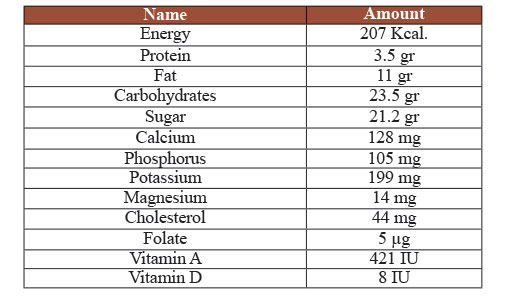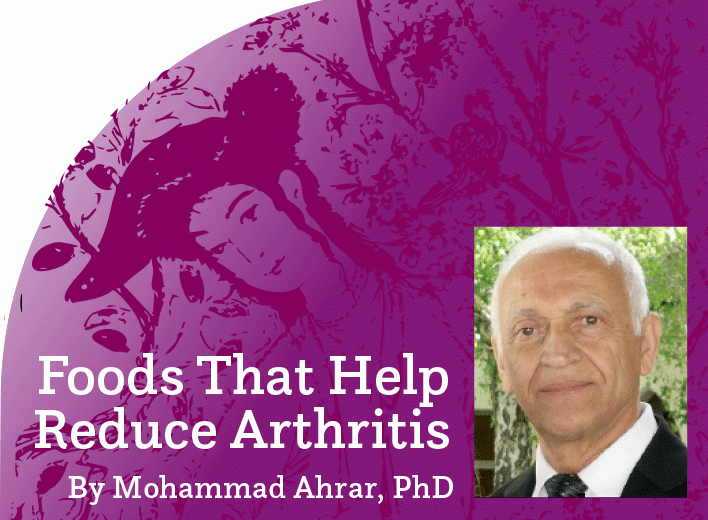 Educational Series
Educational Series
The Science of Nutrition
Is Ice Cream Good For You?
By Mohammad Ahrar, PhD
Introduction
The first thing that comes to mind about ice cream is that eating ice cream makes you fat.
Although there is some truth about ice cream, it actually has some nutritional value that is good for the body. This article explains some facts about ice cream, its nutritional value, and its downsides.
Origin of Ice Cream
It is believed that frozen desserts originated in Persia as far back as 550 BC. (1) Ice was brought from the top of mountains and kept underground, covered by handmade heavy materials and plant fibers which kept the ice frozen until summer. Ice cream was originally made with natural ingredients including milk, sugar, cream (Sarshir), and Salab powder (derived from the tubers of a plant in the orchid family) as a stabilizer. Saffron was also added for its flavor and color.
Modern Ice Cream
Ice cream was introduced to America in 1744, but has only become more popular since the widespread use of refrigeration. In the early days, ice cream was simply made with fruits such as strawberries and milk. Nowadays, a variety of ice creams are commercially produced. In the U.S., legally, ice cream must contain no less than 10 percent butter fat; otherwise, manufacturers can’t sell it as ice cream! If ice cream contains 12-14 percent butter fat, it’s considered “premium,” and 14-16 percent is “super-premium” (like Ben & Jerry’s and Häagen-Dazs). The maximum percentage of butterfat in ice cream is about 20 percent.
Nutritional Value of Ice Cream
Source of Energy Ice cream is a calorie-dense food, rich in sugar and fat, and other nutrients needed for your body to produce energy. Ice cream can provide a quick energy boost when needed, such as during physical activities and competitive games.
Sugar in Ice Cream Normally, sugars in foods such as cake, pastries, and sugary drinks have a high Glycemic Index (GI) and are absorbed quickly from the digestive system and metabolized in tissues to produce energy. The GI is a measure of how fast the blood glucose level increases following consumption of carbohydrates. Foods with high GI raise the blood sugar level very quickly. In ice cream, the rate of absorption of sugar is reduced (lower GI) due to the high fat content. For example, the GI value for wheat bread is 100 versus 65 for ice cream. More information about the GI is explained in Peyk ##165 and 193.
Fat in Ice Cream Fats or lipids produce more than twice as much energy as carbs. Animal fats usually contain long-chain saturated fatty acids which can be metabolized into energy; the excess fat will be converted to body fat. Milk fat also contains saturated fatty acids. However, the fatty acids in milk fat are mostly short-chain and are mostly metabolized to produce energy, with less converted to body fat.
Source of Minerals
Ice cream contains essential minerals that your body needs. Ice cream is rich in phosphorus and calcium. About ½ cup (65 grams) of ice cream provides about 6 and 10% of the Daily Value (DV) of these minerals, respectively. Calcium is a macro mineral important for muscle function, strong bones, teeth health, and for the brain and nervous system to function properly. (2) Calcium can help maintain bone density and reduce the possibility of developing osteoporosis. (Peyk #175) Other minerals found in ice cream are magnesium, iodine, zinc, and potassium, all of which are essential for health. (3)
Protein
Protein is one of the major nutrients necessary for the human body, found in muscles, bones, skin, hair, and the brain—virtually every tissue of the body contains protein. (Peyk #162) Ice cream contains about 3.5% protein. The proteins present in ice cream come from the casein in milk and the whey powder (a byproduct of cheese processing) added to most ice creams. Both sources of proteins in ice cream are considered good quality and provide essential amino acids that the body needs.
Vitamins
Ice cream provides fat-soluble vitamins such as vitamins A, D, E, and K which are essential for health and the immune system. Vitamin A (retinol, retinoic acid) is for vision, growth, cell division, reproduction, and immunity. (Peyk #169) Vitamin D is essential for regulation and absorption of calcium and phosphorus, which are necessary for the growth and development of bones and teeth, as well as improving resistance to certain diseases. Vitamin E is a potent antioxidant. It helps maintain healthy skin and eyes and is important for the reproductive system and for brain health. Vitamin K is involved in the process of blood clotting to prevent bleeding.
The absorption of fat-soluble vitamins in the digestive system requires the presence of fat in the diet. Otherwise, vitamins cannot be absorbed efficiently. Ice cream provides enough fat to allow the fat-soluble vitamins to be absorbed. Additionally, ice cream contains most B vitamins, including B12, niacin, thiamine, folate, and riboflavin, which play a role in metabolic functions of the cells. When fruits such as strawberry, raspberry, banana, mango, and other fruits are added to ice cream, they add more vitamins to the product. More information about Vitamins A, D, E, K, and B are discussed in Peyk ##169, 170, 172, 184, and 186, respectively.
Nutrient content of regular ice cream Per 100 grams

Other Benefits of Ice Cream
Immune Function Because ice cream provides vitamins A, D, and B12, it contributes to better immune function and overall health. (2) Ice cream contains magnesium which is involved in many chemical reactions essential for the immune system.
Nervous System According to a report from Michigan State University, ice creams, particularly those with creamy textures, can trigger the release of neurotransmitters such as dopamine and serotonin, the “feel-good” hormones that play roles in motivation, satisfaction, and overall mood. (2)
Reduce Acid Reflux Ice cream contains bicarbonates, organic acids, and negatively charged ions that can neutralize the inorganic acids such as hydrochloric acid produced by the stomach and, therefore, reduce acid reflux.
Help with Fertility A Harvard study published indicates that those who ate full-fat dairy products or their derivatives (like ice cream) during the trial period lowered their risk of ovulation-related infertility and increased their chance of becoming pregnant, compared to women who ate low-fat dairy products. (4) The study did not give the reasons. One explanation is that steroid hormones such as estrogen and progesterone are made from cholesterol. Most cholesterol is synthesized in the liver from fatty acids. Ice cream provides both fatty acids and cholesterol.
Chocolate Ice Cream Some ingredients, such as chocolate in ice cream, may add more health benefits to the product. The cocoa in chocolate ice cream contains flavanols that may have antioxidative, anti-inflammatory, and antiviral properties. (5) Flavanol also supports the production of nitric oxide in the cells lining blood vessels, which helps improve blood flow, lower blood pressure, and minimize stroke risk and cardiovascular disease. (6)
Potential Downsides
Like most processed desserts, ice cream has several health drawbacks to keep in mind.
High in Added Sugar It is no secret that ice cream is loaded with sugar. Many varieties contain 12–24 grams of sugar in just a 1/2-cup (65-gram) serving. Eating a large cone of ice cream (about 130 grams) provides twice as much sugar, which makes it likely to have a negative effect on health. Excessive sugar intake from foods such as cake, cookies, pie, ice cream, and sugary drinks can be linked to multiple health conditions, including obesity, heart disease, diabetes, and fatty liver. (7)
High Fat Content Ice cream contains saturated fats. If you consume in excess, ice cream can cause weight gain and lead to other health conditions such as type 2 diabetes and coronary artery disease. (7)
Unhealthy AdditivesSome commercially-produced ice creams include ingredients like artificial flavors, additives, and preservatives that are not healthy. Some artificial food dyes, such as Red No. 3 (erythrosine) and Blue No. 2 (indigo carmine), are linked to hyperactivity and behavioral issues in children. Guar gum—which is used to thicken and texturize foods, including ice cream—is generally considered safe, but has been associated with mild side effects, such as bloating, gas, and cramps. Carrageenan, another additive found in ice cream, may promote intestinal inflammation. Therefore, choosing ice cream that contains fewer additives may be a better choice.
Summary
Ice cream is calorie-dense and is rich in sugar and fat, both of which are needed to produce energy. Ice cream can provide a quick energy boost when needed and contains some important nutrients, like calcium, vitamin A, vitamin D, and essential minerals which are beneficial for bone density and general health. Moderate consumption of ice cream can improve the immune system, nervous system, cardiovascular system, and reproductive system.
The potential downside of consuming ice cream is excessive consumption, due to its high sugar and fat content. Some commercially produced ice creams include artificial flavors, additives, and preservatives that are not healthy if consumed excessively.
Ice cream can be part of a balanced diet, but it does not meet the daily requirement for energy, protein, vitamins, and minerals. In other words, you don’t eat ice cream merely for its nutrients. The nutrients must also be provided from other food sources. Check with your healthcare professional to make sure how ice cream can fit into your diet.
____________________________________________
References
(1) https://en.wikipedia.org/wiki/Ice_cream#History
(2) https://msu-prod.dotcmscloud.com/news/the-surprising-health-benefits-of-eating-ice-cream
(3) https://akispetretzikis.com/en/blog/food-info/ti-symvainei-ston-organismo-mas-otan-trwme-pagwto
(4) https://www.thecrimson.com/article/2007/3/1/eating-ice-cream-may-boost-fertility/
(5) https://www.medicalnewstoday.com/articles/flavanols
6) https://www.verywellfit.com/chocolate-ice-cream-nutrition-facts-and-health-benefits-5206300
(7) https://batonrougeclinic.com/is-it-okay-to-eat-ice-cream-every-day/


















